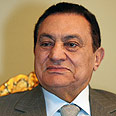
Mubarak wants effort to reestablish Egypt US's chief strategic Arab ally
צילום: AFP
Mubarak: Halt to settlements before gestures
Egyptian president expected to tell Obama administration that Arab nations want peace, but are unwilling to abide Obama’s call to make good-faith concessions to Israel until Jewish state takes tangible steps
Egyptian President Hosni Mubarak is expected to tell the Obama administration in White House meetings beginning Monday that Arab nations want peace, but are unwilling to abide Obama’s call to make good-faith concessions to Israel until the Jewish state takes tangible steps like freezing settlements, an Egyptian official told the New York Times.
According to the newspaper, as part of its effort to resuscitate the peace process, the Obama administration has asked Arab countries to make small but symbolic gestures to normalize relations with Israel, like allowing planes to fly through their airspace or improving cultural ties. The administration has also asked Israel to freeze all growth in settlements.
So far, neither side has agreed to Obama’s proposed first steps, and so the American president is expected to look to Mubarak for help in breaking the latest Middle East deadlock, regional analysts said.
Mubarak will arrive in Washington for his first American visit in five years, accompanied by Foreign Minister Ahmed Aboul Gheit and his country's intelligence chief, General Omar Suleiman. He was scheduled to meet Monday with Vice President Joe Biden and other officials, and is to meet with Obama on Tuesday.
Hossam Zaki, spokesman for Egypt’s Foreign Ministry said Mubarak would tell Obama that from the Arab perspective, the best way to build confidence is to press Israel to freeze settlements, implement an economic plan to improve life in the West Bank, ease pressure on Gaza and agree to negotiate with all issues on the table, including the status of Jerusalem and refugees.
“If they do this and engage immediately in negotiations with Abu Mazen (Palestinian President Mahmoud Abbas), this is a recipe for openness and the Arabs will make the gestures needed,” Zaki said. “But they don’t want to make this first step. They are demanding the Arabs make the first step. The Arabs should not make the first step. They are the occupying power. The occupation must end.”
'Egypt’s opinion is unshakable'
According to the newspaper, Mubarak’s visit to Washington signals an effort to reestablish Egypt as the United States’ chief strategic Arab ally after years of tension and animosity between Washington and Cairo. Mubarak had refused to visit Washington in protest over President Bush’s Middle East policies, the invasion of Iraq and the public criticism of Egypt’s political and human rights record.
Political analysts said Obama was pressing Saudi Arabia to take the lead in offering so-called confidence-building measures to Israel, but the Saudis flatly refused, saying they had already produced a peace initiative endorsed by all 22 members of the Arab League.
Zaki told the NY Times that the presidents would address many issues besides the peace process, including Iran, Sudan and extremism.
But on the peace process, he said, Egypt’s opinion is unshakable.
“We think this huge gap of confidence requires movement from the Israelis first,” he said. “Then the Arabs are willing to make gestures. This is the way Arabs see it.”










